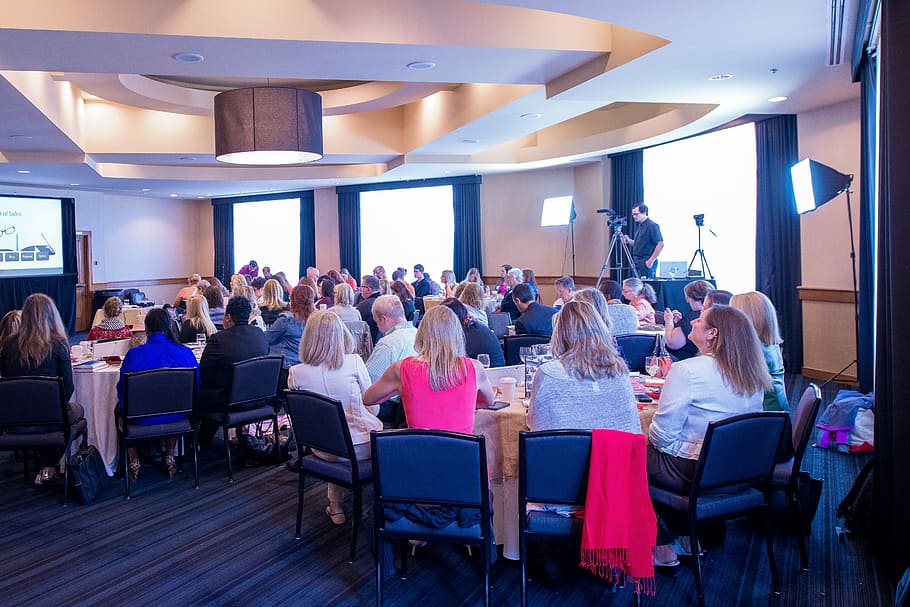Event marketing is essential for the success of any event, whether it’s a conference, trade show, workshop, or festival. Knowing how to promote your event and engage the right audience will determine the level of participation, satisfaction, and overall impact. In this blog, we’ll cover seven practical tips to help event organizers elevate their event marketing efforts.
1. Start Early with a Clear Goal
Effective event marketing starts well before the event itself. One of the most important steps is setting a clear goal. Knowing exactly what you want to achieve with your event helps guide your entire marketing strategy. For example, are you looking to increase brand awareness, generate leads, or build a stronger community around your industry?
Once you define the event’s goal, you can tailor your marketing messages accordingly. An early start gives you time to build awareness and ensure that your audience knows about your event long before it takes place.
Steps to Take:
- Define your event objectives, such as attendance numbers or lead generation.
- Create a timeline that outlines all marketing activities leading up to the event.
- Develop a strong event identity, including a name, tagline, and messaging, that aligns with your goal.
Why it Works: By having clear objectives, your marketing efforts will be more focused, and potential attendees will know exactly what to expect. Starting early also gives your campaign ample time to reach a larger audience.
2. Leverage Social Media Marketing
Social media is one of the most cost-effective and powerful tools for event promotion. It allows you to reach a global audience while engaging with potential attendees in real-time. The key to success on social media is consistency and interaction.
How to Use Social Media:
- Create dedicated pages or event profiles on platforms like Facebook, Instagram, and LinkedIn.
- Use engaging visuals such as graphics, videos, or behind-the-scenes content to build excitement.
- Post regular updates about the event, including speaker announcements, session highlights, and logistical information.
- Encourage attendees to share their excitement by creating a unique event hashtag.
Don’t forget to interact with your audience by responding to comments, answering questions, and encouraging conversations around the event.
Why it Works: Social media helps build community and excitement around your event. Regular updates keep your event fresh in people’s minds, while the use of visuals increases engagement.
3. Create Valuable Content
Content marketing plays a significant role in promoting your event. By providing valuable content related to your event’s theme or industry, you can position your event as a must-attend for your target audience.
Consider these types of content:
- Blog Posts: Write articles about topics relevant to your event’s audience. For example, if your event focuses on digital marketing, you could write about trends in the field, key challenges, or success stories.
- Webinars and Videos: Offer exclusive behind-the-scenes looks, interviews with key speakers, or previews of sessions. Videos are highly engaging and can be easily shared across different platforms.
- Whitepapers or E-books: Share in-depth insights related to your event’s theme. This will position your event as an authority on the subject, attracting professionals who want to learn more.
Why it Works: Valuable content not only helps to engage your audience but also positions your event as a thought leader in your industry. When you provide useful information, people are more likely to attend your event to gain further insights.
4. Utilize Email Marketing
Email marketing is a direct way to reach potential attendees, whether you’re engaging past participants or targeting a new audience. A well-planned email campaign can inform, excite, and ultimately convert prospects into attendees.
How to Execute Effective Email Campaigns:
- Segment Your List: Tailor your messages to different segments of your audience. For example, send personalized invitations to past attendees, offering early-bird discounts or exclusive content.
- Create Attention-Grabbing Subject Lines: The subject line is the first thing people see, so make sure it stands out and sparks curiosity.
- Send Reminders: As the event draws closer, send reminders that include key event information like dates, locations, and registration deadlines.
Also, ensure your emails are mobile-friendly, as many people will read them on their phones.
Why it Works: Email marketing allows you to directly reach people who have already shown interest in your event. Personalized and targeted emails increase the chances of turning interest into action.
5. Build Partnerships and Collaborations
Collaborating with other organizations, influencers, or businesses in your industry can significantly amplify your event marketing efforts. Partnerships help you reach new audiences and add credibility to your event.
Ways to Build Partnerships:
- Industry Influencers: Identify key influencers or thought leaders in your industry and invite them to participate as speakers or panelists. In return, they will likely promote your event to their followers.
- Corporate Sponsors: Work with businesses whose target audience aligns with your event’s demographic. Offer sponsorship packages that include promotional opportunities such as co-branded marketing materials, dedicated emails, or social media mentions.
- Media Partnerships: Partner with industry publications or websites to help spread the word. This could include article features, guest blogs, or media sponsorships that increase visibility.
Why it Works: Collaborations help you tap into new audiences and lend credibility to your event. By partnering with respected figures or businesses, you increase the likelihood of attracting attendees who trust these influencers or brands.
6. Engage Attendees Through Interactive Tools
Creating engagement before and during the event is crucial to its success. Use interactive tools to involve attendees in the marketing process and keep them excited about the event.
Examples of Interactive Tools:
- Polls and Surveys: Create polls or surveys about your event’s sessions, topics, or speakers. This not only generates buzz but also provides valuable insights for your event planning.
- Event Apps: If you’re using an event app, encourage attendees to engage through social walls, live Q&A sessions, or real-time polls.
- Gamification: Introduce challenges or quizzes leading up to the event. Offer rewards like free passes, VIP access, or exclusive content for participants.
Encouraging interaction helps build a sense of community among attendees, making them more invested in the event’s success.
Why it Works: Interactive tools allow attendees to feel like they’re part of the event’s story. Engaging participants early helps keep them involved, increasing both attendance and satisfaction.
7. Measure and Optimize Your Marketing Efforts
Once your event marketing campaign is in motion, it’s crucial to track its performance and make adjustments where needed. The more you analyze your efforts, the better you’ll understand what works and what doesn’t.
Key Metrics to Track:
- Registration Numbers: Keep an eye on how many people are signing up and when. If registration spikes after a specific marketing push, you can replicate that tactic.
- Social Media Engagement: Look at likes, shares, comments, and mentions of your event hashtag. This will give you an idea of how well your content is resonating with your audience.
- Email Click-Through Rates: Monitor which emails are getting the most clicks. You can use this data to tweak future email campaigns to increase engagement.
Tools like Google Analytics, social media insights, and email marketing software can help you gather data and make informed decisions throughout your campaign.
Why it Works: Measuring your marketing efforts allows you to pivot and optimize your strategy in real-time. This way, you can ensure that you’re getting the most out of your marketing budget and achieving your event goals.
Conclusion
Event marketing is essential to the success of any event. By starting early, leveraging social media, creating valuable content, utilizing email marketing, building partnerships, engaging attendees with interactive tools, and tracking your results, you can ensure your event is not only well-attended but also leaves a lasting impression on participants.
Use these tips to guide your next event marketing campaign and watch your attendance and engagement grow.
Amazon Brand - Presto! Garbage Bags Large 90 Count|24 x 32 Inches Black , For Dry & Wet waste|15 bags/roll (Pack of 6)
₹345.00 (as of 20 November, 2024 18:31 GMT +05:30 - More infoProduct prices and availability are accurate as of the date/time indicated and are subject to change. Any price and availability information displayed on [relevant Amazon Site(s), as applicable] at the time of purchase will apply to the purchase of this product.)Scenty Portable Mini Sealing Machine, Handheld Packet Sealer for Food, Snacks, Chips, Fresh Storage, Plastic Bags Sealing Machine, Type C Charging Vaccum Sealers
₹296.00 (as of 21 November, 2024 18:32 GMT +05:30 - More infoProduct prices and availability are accurate as of the date/time indicated and are subject to change. Any price and availability information displayed on [relevant Amazon Site(s), as applicable] at the time of purchase will apply to the purchase of this product.)2 Pcs Kitchen Mats, Waterproof Memory Foam Kitchen Rugs, Standing Desk Mat Floor Mats, Comfort Runner Rug Carpets for Kitchen Floor, Sink (c)
₹549.00 (as of 21 November, 2024 18:32 GMT +05:30 - More infoProduct prices and availability are accurate as of the date/time indicated and are subject to change. Any price and availability information displayed on [relevant Amazon Site(s), as applicable] at the time of purchase will apply to the purchase of this product.)Prestige 1.5 Litres Electric Kettle (PKOSS 1.5)|1500W | Silver - Black| Automatic Cut-off | Stainless Steel | Rotatable Base | Power Indicator | Single-Touch Lid Locking
₹699.00 (as of 20 November, 2024 18:31 GMT +05:30 - More infoProduct prices and availability are accurate as of the date/time indicated and are subject to change. Any price and availability information displayed on [relevant Amazon Site(s), as applicable] at the time of purchase will apply to the purchase of this product.)Thamada Mart® Handy Electric Heater, 400 Watts Heater, Plug-In Heater, Mini Heater, Portable Room, Office, Bedroom Heater/Warmer with LED Display, Set Temperature, and Stylish Design (Black)
₹639.00 (as of 21 November, 2024 18:32 GMT +05:30 - More infoProduct prices and availability are accurate as of the date/time indicated and are subject to change. Any price and availability information displayed on [relevant Amazon Site(s), as applicable] at the time of purchase will apply to the purchase of this product.)Discover more from The General Post
Subscribe to get the latest posts sent to your email.





